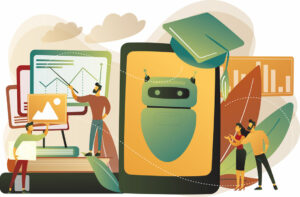In today’s “Knowledge Age,” human capital, of which knowledge is the major component, has become the most important economic resource, supplanting the traditional factors of production, land, labor, and (physical) capital.
Knowledge has certain unique properties that distinguish it from physical and financial resources and must therefore be managed differently.
IMPLICATIONS OF AI DEVELOPMENTSThere are fears, both among organizational decision makers and thought leaders, that current developments in Artificial Intelligence (AI), notably the emergence of Generative AI, such as ChatGPT and DeepSeek, will soon achieve human cognitive capabilities and will eventually replace humans in many facets of social and organizational life.
Debates on this issue continue to rage on and will probably remain unsettled for an indefinite period of time.
It is generally agreed that AI — Generative AI, in particular — provides a useful set of tools for professional practitioners and top-level decision makers of organizations and social institutions. However, those who occupy lower levels in the organizational and social hierarchies and who typically do routine and repetitive tasks are bound to lose their jobs to AI and will have to develop new skills that are more employable, such as entrepreneurial and specialized technical skills.
Due to inherent limitations of AI, strategic and other high-level choices will continue to be the responsibility of highly trained and experienced human decision makers.
DIGRESSION: LIMITATIONS OF AIIn a revealing admission of its shortcomings, the widely used AI platform ChatGPT, when asked the question, “Will generative AI eventually exceed human cognition?” answered that AI can “…augment human decision making, but not replace human judgement, empathy, or moral reasoning.”
Specifically, ChatGPT stated that:
• AI lacks true understanding: AI models, including advanced ones, process data statistically — they recognize patterns but do not understand meaning. They cannot reason, feel, or possess common sense like humans.
• AI is highly data-dependent: AI systems rely heavily on large, high-quality datasets. If data is biased, incomplete, or wrong, the AI’s output will reflect those flaws (“garbage in, garbage out”).
• AI lacks creativity and judgment: While AI can generate art or text, it doesn’t create with intent or purpose; it recombines patterns from existing data rather than inventing from experience.
For these reasons, AI cannot be truly creative as human artists, nor be as competent as seasoned professional managers, practicing lawyers, and medical specialists. While AI can be factually correct and can solve complex problems based on raw data more accurately than humans, it is unable to provide useful insights based on experience.
IMPLICATIONS FOR EDUCATIONAL POLICYRecent developments in AI have important implications on society’s educational policy. It has significantly reshaped the nature of work, and must be adapted to the changing needs of workers.
We focus on a specific issue: the design of educational programs and curricula.
In order to meet the country’s economic growth and developmental goals, and in line with our desire to reduce extreme poverty and economic inequality, our educational policy must be geared towards developing our stock of human capital, along with the values and attitudes that insure that this economic resource is put to good use. Not only is human capital today’s most productive resource, but it is also readily transferable to the economically disadvantaged, making them more potentially active in creating value — for themselves and for society.
One specific development is particularly bothersome.
There have recently been moves in the Philippine Senate to revise tertiary education to make it more relevant in the application of theoretical concepts and principles on mundane issues, rather than being purely abstract and academic. In particular, it has been proposed that the long-standing General Education (GE) program should be relegated to senior high school (Grades 11-12) to make way for courses that are relevant in dealing with practical matters, or, alternatively, assign it to the Technical Education and Skills Development Authority (TESDA).
We feel that this proposal is inappropriate largely because neither high school teachers nor TESDA trainers have the necessary academic background and required competence to handle GE courses.
Perhaps a more appropriate strategy is to rethink our academic programs at all levels to focus on developing the learners’ ability to think critically and to analyze issues holistically, and to assign the development of vocational skills to TESDA and the many other technical schools located in various parts of the country.
Finally, both academic and vocational programs should prepare students for lifelong learning to enable them to adapt to continuously changing technologies and environments.
The article reflects the personal opinion of the author and does not reflect the official stand of the Management Association of the Philippines or MAP.
Dr. Niceto S. Poblador is a member of the MAP Shared Prosperity Committee and a retired professor of Economics and Management at UP Diliman.
